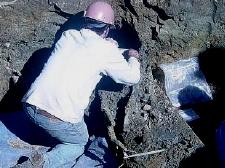|
FRESH STUFF DAILY |
|
|
||
|
|
||
|
|
||
|
SEE ALL SIGNED BOOKS by J. Dennis Robinson click here |
||
Portsmouth has a rare chance to tell the world how it feels about the city's checkered past of slavery and discrimination. Locals met recently to discuss repatriation of ancient remains discovered under city streets. Why not make this moment count.
It is official. DNA testing confirmed two months ago that at least two of the burials discovered under the streets of Portsmouth, NH last fall are African American. Now comes the debate over what to do with the remains. In an open forum at Portsmouth City Hall last night, the public view was crystal clear – put the bodies back where they came from. Everyone involved in the project, from city officials to African American advocates appear to agree that this is the lost "Negro Burying Ground". Based on the historic record, and the small number of blacks living in the city, no other conclusion makes sense. Thirteen bodies were discovered at the corner of Chestnut and Court streets during road construction last October. The wooden coffins appear to be from the 18th century. Eight were pulled from the ground for study. There was discussion of repatriating the remains near a known slave cemetery discovered years ago behind Christ Church across from the MacDonald’s on the outskirts of town. The consensus among those at last night’s hearing was that the bodies belong downtown. A number of speakers suggested that traffic be diverted permanently from the burial area, but no one knows how large that area may be. The Negro Burying Ground may have served the African American community here for a century or more. There is speculation that graves extend under homes and roads another 100 feet toward State Street. Workers digging in the area decades ago reportedly found other human remains a researchers admitted last night that the site could contain 100 graves or more. There is no one to blame here. The people who made the decision to build the expanding city on top of its only black cemetery are long gone to dust. Records as early as 1705 indicate that the area was purposely set aside for African American burials. But it is still possible, as archeologists point out, that no conscious decision was ever made to pave over the graves. Early nineteenth century builders may not have seen the battered wooden crosses and boulders likely used to mark the graves. Grave sites of poor and disenfranchised citizens, regardless of race, turn up in building and road construction with some frequency, according to Boisvert. The question now, is whether to make much or little of this discovery. We can reverently repatriate these bones and go on living among the dead. Or we can attempt to make reparations here. Portsmouth can, for one, officially accept this site as the true location of an historic African American Cemetery. We can divert the flow of traffic in a designated area and do what we do for every other known cemetery in the city – drive around. It seems only reasonable that our busy lives can be interrupted here in memory of a population stolen, enslaved, impoverished and then ignored for centuries. We can beautify the area as we would any cemetery. We can put up a monument. We can do more research and tell more stories. We can visit. We can think. We can do anything except nothing. All this can be done with public agreement and private funds. That would be a worthy statement in itself. But it would certainly be a greater statement if we did all this as a city – if we did what needs doing and spent what it cost without whimper or dissent. Portsmouth, for all its history, is sadly lacking in public sculpture. We have a man on a horse at Haven Park. We have another Civil War monument at Goodwin Park, an area just restored at great cost, although not to the local taxpayer. Those were heartfelt, but obligatory sculptures, unremarkable and indistinct from most small New England towns. Now we have a real opportunity to say something important, and the chance to tell everyone who comes through town how we feel. We apologize for building streets over graves. We are sorry that slavery and discrimination lived so close for so long near the heart of America. We are joyous that we are beginning to heal at last. We are honored that those sleeping under the streets of Portsmouth have spoken up at last. And we will take time to stop in the middle of the road, if only for a moment, to think of the ancient cemetery hidden there. That’s what memorials do. They give the living pause. --- JDR SEE: Portsmouth Black Heritage Trail Please visit these SeacoastNH.com ad partners.
News about Portsmouth from Fosters.com |
| Thursday, April 25, 2024 |


|
Copyright ® 1996-2020 SeacoastNH.com. All rights reserved. Privacy Statement
Site maintained by ad-cetera graphics





 Honoring the "Negro Burying Ground"
Honoring the "Negro Burying Ground"














